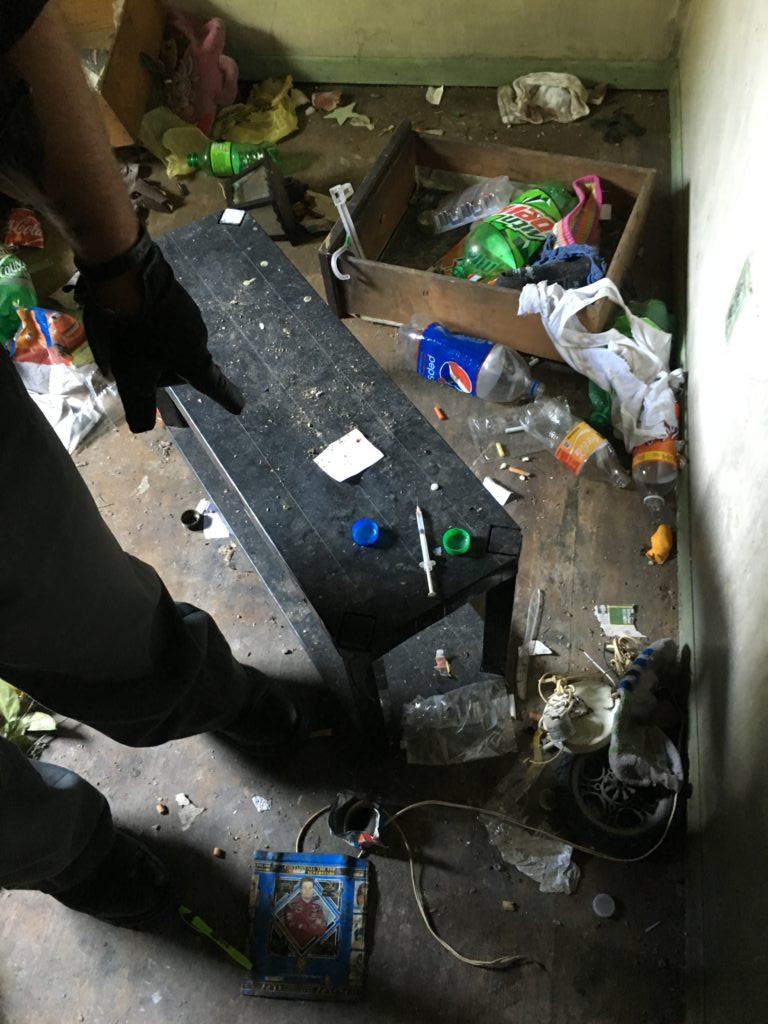The morgue in Dayton, Ohio where victims of America’s opioid epidemic are brought to rest. Picture by Ian Birrell.

The photo above is of the morgue in Dayton, Ohio where victims of America’s opioid epidemic are brought to rest. Picture by Ian Birrell.
Last weekend I was in Houston when the hurricane hit. The winds smashed into buildings, the rain lashed down. It was an extraordinary experience as I drove along peering through the deluge. I watched torrents of water pour over the side of freeways and saw the flooding start to rise in urban streets before my eyes. As I write the death toll is 35. It is thought that 100,000 homes have been devastated. The clean-up bill could come to $80bn. The president and vice-president have both been to inspect the damage.
This is obviously a major disaster. Yet another far more deadly and corrosive crisis is sweeping the United States, although fewer people seem to recognise its epic scale.
Each day the over-use of opioids (powerful pain-reducing medications) kill an estimated 142 Americans.
In the week since Hurricane Harvey tore into Texas, almost 1,000 citizens have died from this catastrophe.
Last year there were an estimated 59,000 drug deaths.
This adds up to more American corpses than during 20 years of fighting in Vietnam.
It means more Americans are dying from this addiction than in car accidents[1. Last December NBC News reported: “Overall, overdose deaths rose 11 percent last year, to 52,404. By comparison, the number of people who died in car crashes was 37,757, an increase of 12 percent… Rates for 8 of the 10 leading causes of death rose last year, causing the nation’s life expectancy to go down for the first time in more than 20 years.”].
Or from guns.
Or even from AIDS at peak of the epidemic.
America is enduring a death toll equal to the September 11 terror attack every three weeks (as a presidential panel led by New Jersey’s Governor, Chris Christie, pointed out) and these terrifying numbers could double this year as potent new synthetic opioids pour into the market. Those dying include babies who come into contact with them, such is their strength, and dealers chopping up their stash who inhale their own products. They include teenagers, students, soccer mums and pensioners. Yet most of the victims are white, male and middle-aged, many far removed from the usual stereotypes of the typical street addict – although they exist also.
(Governor Chris Christie told CNN’s Jake Trapper that the death caused by addiction to opioid was equivalent to that killed on 9/11 every three weeks)
Before going to Houston, I spent several days on the frontline of the disastrous drug war for The Mail on Sunday in Dayton, Ohio. It was shocking to see the carnage as I talked to users, families, doctors and cops in a city thought to suffer the highest rates of fatal overdoses in America. One police officer told me he saw his first heroin overdose only six years ago – yet there were a dozen during four hours we patrolled around town. One drug-addled couple were slumped in their crashed car after zonking out while driving away from their dealer.
Donald Trump seemed to declare the opioid crisis a national emergency on August 10, but since then has done nothing beyond offering naive Nancy Reagan-style advice. ‘If they don’t start, they won’t have a problem,’ he said, ignoring the cruel reality of both addiction and of the crisis gripping his country. There are so many opioids on the streets the price of a hit has fallen to $5 in some places. Dealers even give away free samples to attract fresh clients; promotional capsules to people in one city buying cannabis; two free hits at start of each month for all new buyers in another.
This rampant free market shows how efforts to stop drug use have failed. If maximum-security prisons cannot be protected, what hope wider society? Governments have handed control of an incredibly-lucrative market to the most vicious vendors on earth. The results are inevitable: the strength of drugs soars as dealers seek maximum profits from minimum quantities needed to smuggle. We saw the same with smoked opium replaced by injected heroin and with alcohol patterns during prohibition; we have seen it with marijuana succeeded by much stronger skunk, then potentially-deadly spice; and now we see it in most toxic form with heroin replaced by super-strong synthetics such as fentanyl and carfentanil, 10,000 times more powerful than morphine. Fentanyl has also now arrived in Britain, with 60 related-deaths so far.
As with any market that has potential to cause death, there should be state control and regulation. Clearly dire warnings, zero tolerance and prohibition have failed; drugs need to be legalised. Heroin used to be the drug for losers. But as one gangster told me, his young customers see it as cool and move rapidly from smoking spliffs to smoking smack. The profits are mind-blowing: fentanyl costing $1,000 from China might sell on US streets for $1 million. And such is the consequent desperation that deaths attract new customers since fatalities show a strong batch has turned up in town.

US police are so swamped some admit they have moved largely from a criminal to a medical response – effectively, decriminalising use of even hardest drugs. They administer Narcan to save addicts from overdoses, then take them to hospital and finally try to persuade them to seek recovery. I saw one officer simply sweep a huge pile of crystal meth on the floor of a burned-out house being used for shooting up, despite the fact that there was enough for hundreds of hits. Opioid capsules were left scattered on the ground, along with a liquid-filled syringe.
“We have educated ourselves to understand this is a problem of addiction,” said Phil Plummer, Dayton’s police chief. “I’ve changed my attitude. I was very hardcore – thinking you could arrest people but you just see the same people again and again.” Yet this was no liberal. The sheriff is a committed Republican and determined to catch dealers, although he admitted even major drug seizures make little impact on the market. This symbolises how there is a dawning realisation that the war on drugs, declared 46 years ago, has failed. That realisation is greatest among those fighting on the frontline.
There should be prevention and treatment, not punishment – as some countries have already realised. But as Washington debates spending cuts and healthcare reform, overloaded services in the worst-hit states struggle to cope. Not just in obvious public services such as fire, police and hospitals. Foster services are overwhelmed with orphans and children who have been removed from drug-using parents. There is talk that schools may be seeing a rise in behavioural and developmental problems caused by babies who are born already hooked on drugs through their mother’s use of opioids. And firms struggle to find workers who can pass drug tests.
Plummer also spoke movingly about the crisis erupting in his home town that used to have a giant car plant but was now filled with people struggling to get jobs and to keep their heads above water. They end up self-medicating. Many have mental health issues that go untreated. Others share his view that this crisis is symptom of despair and alienation in much of Middle America. This disgruntled mood led Montgomery County, which includes Dayton, to switch from supporting Democratic presidential candidates for almost three decades to back the insurgent Republican Trump.
Yet this addiction ripping apart communities should also ring alarm bells over more acceptable forms of capitalism. Big Pharma often gets a bad rap despite the impact of its innovations on life expectancy and on crippling health conditions. But there is no doubt the roots of this deadly epidemic lie with firms that pushed highly-addictive opioids as pain relief to millions of people who did not need such strong medicine. Industrial promotion of drugs helps explain why the US is suffering more than other advanced nations with better-regulated health systems. In Ohio, a bellwether state in US elections, almost 800 million doses were doled out in 2012 – enough to give 68 pills to every single person in the state. Now it leads the nation in overdose deaths.
This was capitalism at its least ethical. Many of the drugs, often dispersed by dodgy doctors in ‘pill mills’, ended up on the streets. Those desperate addicts may have begun taking prescribed opioids as a high-school kid as relief from a sports injury, as a dad with a bad back or a mum hurt at work. They then switched to heroin once hooked, because legal supplies dried up or prices soared above street-traded alternatives. Mike DeWine, Ohio’s attorney general, told me of seeing one doctor being busted who had “no nurse, no receptionist, just him sitting at a table with a prescription pad”. This man had churned out 43 prescriptions by 11.15am at $200 a time.
The tobacco industry lacks any morality, given the deadly nature of their products. Turning a blind eye to wasted lives and corroded communities while raking in huge profits from heavily-promoted products does not make the pharmaceuticals industry look much better, however. Drug firms deserve to lose looming court battles brought by state politicians who’ve witnessed the human wreckage associated with addiction that is scattered across America.
Today gangsters on urban street corners chant names of prescription opioids while also flogging heroin and fentanyl. And in the ten minutes you might have spent reading this article, one more American citizen has died in a tidal wave of tragic despair.










Join the discussion
Join like minded readers that support our journalism by becoming a paid subscriber
To join the discussion in the comments, become a paid subscriber.
Join like minded readers that support our journalism, read unlimited articles and enjoy other subscriber-only benefits.
Subscribe